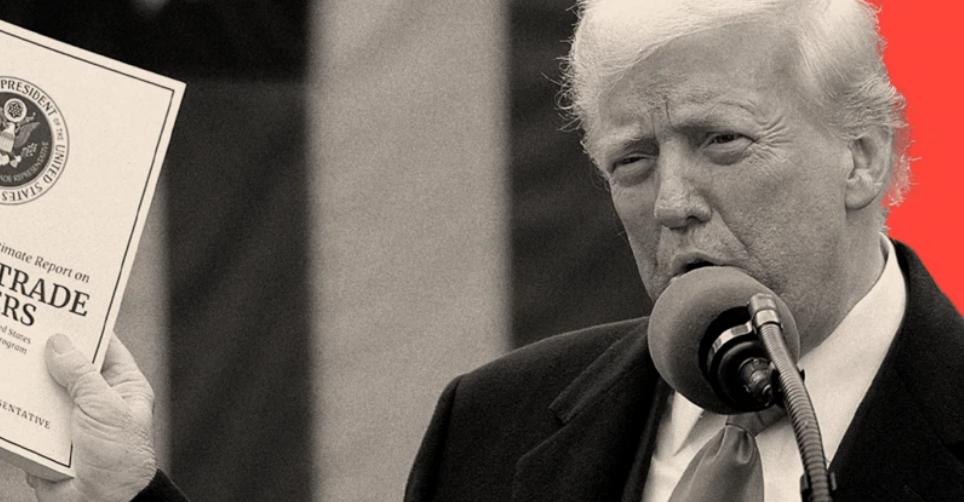
In the current context of highly interconnected global economy, the new round of high tariff policies implemented by former US President Donald Trump has not only escalated trade tensions between China and the United States, but also shaken the confidence of international investors in the stability of the US economy. In particular, the status of US treasury bond bonds, the traditional "safe haven", has been shaken unprecedentedly in the market panic, triggering an in-depth discussion on financial trust and the trend of global macro policies.
First of all, it is worth noting that the yield of US treasury bond bonds soared rapidly. The yield of the 10-year treasury bond climbed from 3.9% to 4.5%, hitting a new high in recent months. A rise in yields means a fall in bond prices, which is precisely due to the massive selling of treasury bond bonds by investors. This phenomenon itself is highly alarming: for a long time, the US treasury bond bond has been considered as the preferred tool for global capital hedging, but now it has become an export for risk release.
The core driving factor behind it is the comprehensive high tariffs imposed by the Trump administration on imported goods. Against the backdrop of the escalating trade war between China and the United States, the United States has not only imposed tariffs of up to 125% on Chinese products, but also affected trade relations between other major economies and the United States. Although in the short term, Trump announced a 90 day suspension of tax increases on some countries to stabilize market sentiment, causing a brief rebound in the US stock market, the bond market's response better reflects the unease of long-term expectations.
The reason why investors panic is not only due to concerns about inflation caused by global supply chain disruptions and rising costs, but also directly due to doubts about the sustainability of the US fiscal system. Although high tariffs may stimulate the return of certain manufacturing jobs in the short term, their negative effects are evident from a macro perspective: increased import costs, pressure on corporate profits, stock market volatility, rising consumer prices, ultimately dragging down overall economic performance. JPMorgan Chase has raised the probability of a US economic recession from 40% to 60%, which reflects this logic.
What is particularly serious is that the "uncertainty" conveyed by this policy has made the global market more anxious. El Erian, the chief economic adviser of Allianz, pointed out that the vacillation of the status of US bonds as a "safe haven" marked a rift between investors and the US credit system itself. And this rift is not only affecting the United States, but also spreading globally. The UK bond market yield rose synchronously, and the Bank of England even issued a rare warning that the US policy would "pose a major risk to global financial stability".
The role of the Federal Reserve in this has become increasingly subtle. On the one hand, its responsibility is to stabilize prices and promote employment; On the other hand, facing the inflationary and growth pressures brought about by high tariffs, it may be forced to adopt loose policies (such as interest rate cuts or restarting bond buying programs) to stabilize the market. But as analysts have pointed out, this will be a dilemma operation, and even a slight mistake could lead to more serious consequences, such as weakening the credit base of the US dollar or causing inflation to spiral out of control.
Trump's policy goals - restoring manufacturing, increasing wages, and reducing trade deficits - have a certain appeal in the political context. However, from an economic perspective, this strategy of seeking "America First" through "isolationism" is more of a short-term populist dividend at the expense of sacrificing global order and investment confidence.
Ultimately, whether it is bond market sell-off, stock market volatility, or a decline in corporate confidence, all point to a common problem: in the context of globalization, isolationist policies cannot bring true prosperity, but may instead trigger broader systemic risks. As experts have said, "There are no winners in this trade war, and the losers will be the global economy." If this trend continues, not only will the United States face a dual blow of weak growth and rising fiscal costs, but the global market will also be under pressure and enter a more turbulent and uncertain era.

報告顯示,中國電力投資加速增長,預計2024年電網基建投資將超過5300億元。
近日,市場迎來了一則引人注目的消息:工業巨頭3M公司(MMM.N)在本周五公布了其季度業績報告,隨後股價飆升至近兩年來的
最近,外媒給OpenAI算了筆賬,今年可能要血虧50億美元。
近日,巴黎奧運會和世界鐵人三項協會聯合發布了一項重大決定,宣布因塞納河水質污染問題,原定於近期進行的奧運會鐵人三項首次下
當地時間7月18日,法國巴黎發生了一起令人震驚的持刀襲警事件。
近期,一則重大消息在國際舞臺上引起軒然大波,馬來西亞宣布加入金磚國家。
調查發現,互聯網和智能手機的使用幹擾了韓國近五分之一學生的生活。